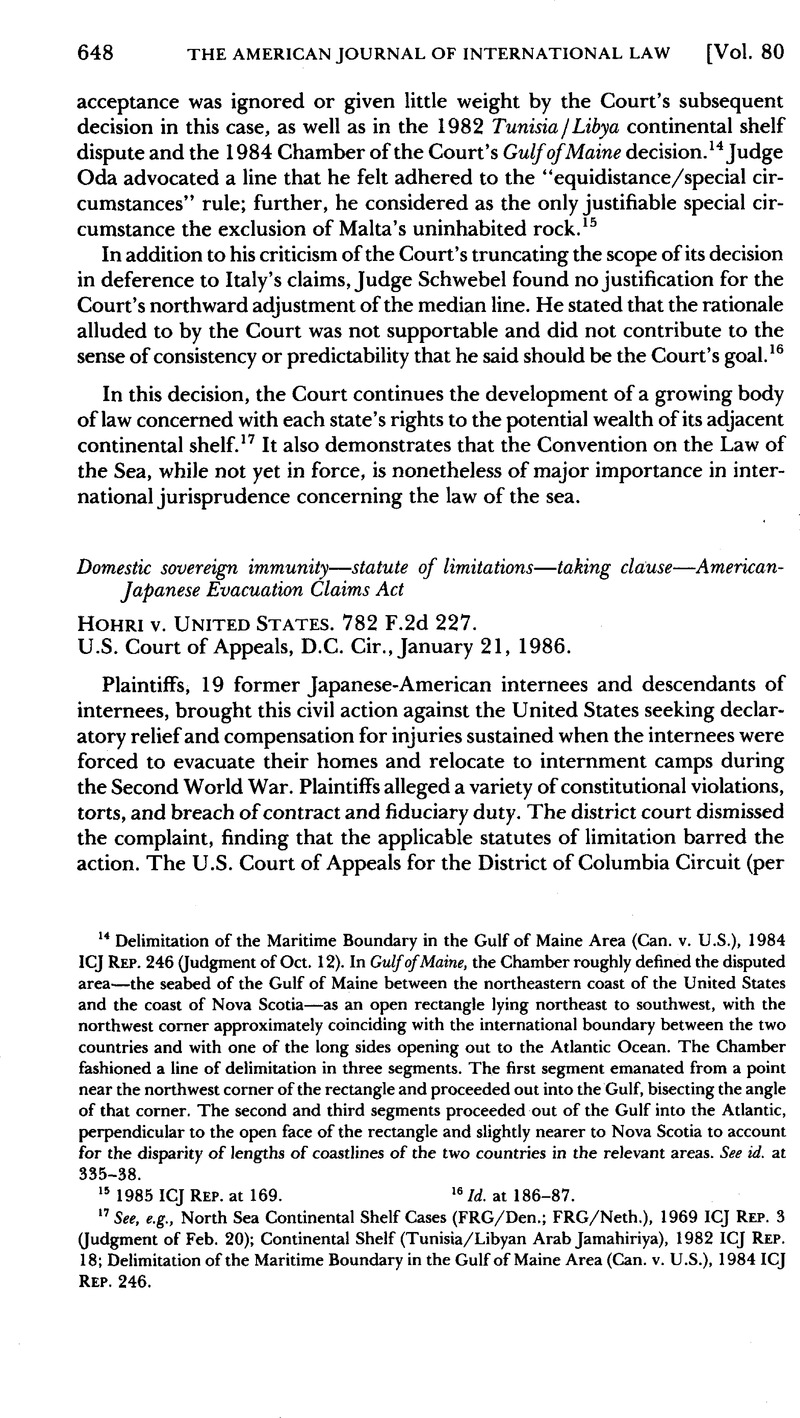No CrossRef data available.
Published online by Cambridge University Press: 27 February 2017

1 U.S. Const, amend. V. The “Takings Clause” of the Fifth Amendment provides that “[n]o person shall . . . be deprived of life, liberty, or property, without due process of law; nor shall private property be taken for public use, without just compensation.”
2 The full title of the report is Report of the Commission on Wartime Relocation and Internment of Civilians, Personal Justice Denied (1982).
3 Additionally, the United States asserted that the court did not have jurisdiction to hear the appeal. The court acknowledged that the U.S. Court of Appeals for the Federal Circuit has exclusive jurisdiction over appeals from the district court if original jurisdiction was based, as in this case, “in whole or in part” on claims under the Tucker Act. See 28 U.S.C. § 1295(a)(2) (1982); 28 U.S.C. §1346(a)(2) (1982). However, an exception exists where original jurisdiction is based on the Federal Tort Claims Act (FTCA), 28 U.S.C. §1346(b) (1982). The court of appeals held that although the district court had dismissed the plaintiffs’ FTCA claims, plaintiffs’ action nonetheless was based in part on those claims and therefore it fell within the exception permitting the D.C. Circuit court to entertain the appeal. Chief Justice Markey, dissenting, maintained that Congress intended the exception clause to apply “only to cases brought in whole under one of the excepted subsections.” 782 F.2d 227, 257 (Markey, C.J., dissenting). Because the appellate court affirmed the lower court’s dismissal of plaintiffs’ FTCA claims but remanded the case, it noted that subsequent appeals could be brought only in the Federal Circuit court. Id. at 241 n.31.
4 782 F.2dat 242 (citing Ruckelshaus v. Monsanto Co., 467 U.S. 986, 1016, 104 S.Ct. 2862, 2880 (1984)).
5 553 F.2d 220 (D.C. Cir. 1977).
6 782 F.2d at 250.
7 Id. at 234.
8 Edward Ennis, Director of the Alien Enemy Control Unit at the Justice Department, read the Ringle report at the time it was issued and informed the Solicitor General by memorandum of its contents. He recommended advising the Supreme Court of the report, stating that “any other course of conduct might approximate the suppression of evidence.” Id.
9 Id. at 252.
10 Id. at 251. The court based this conclusion on an assessment of events occurring after Korematsu that indicated that Congress and the executive branch believed that the Supreme Court’s decision precluded civil damage actions based upon the internment program. Referring to the legislative history of the Japanese-American Evacuation Claims Act, 50 U.S.C. app. §§1981 et seq. (1982), the court noted that the statute was enacted in response to a perceived moral obligation and not to redress a “legal wrong.” 782 F.2d at 237-38. In a letter from the Secretary of the Interior to the Speaker of the House, the Secretary assumed that “[t]he only clear recourse which the evacuees now have [is] through the passage of private relief bills.” Id. at 238 (quoting H.R. Rep. No. 732, 80th Cong., 1st Sess. 3 (1947)).
11 782 F.2d at 253 (citation and footnote omitted).
12 A petition for rehearing filed by the United States was denied on May 30, 1986.